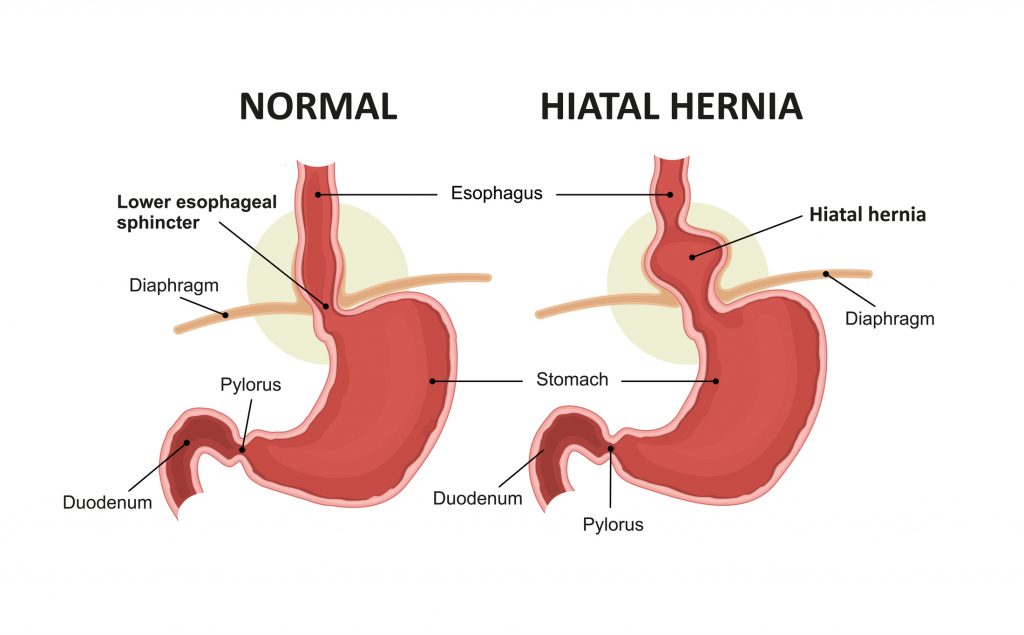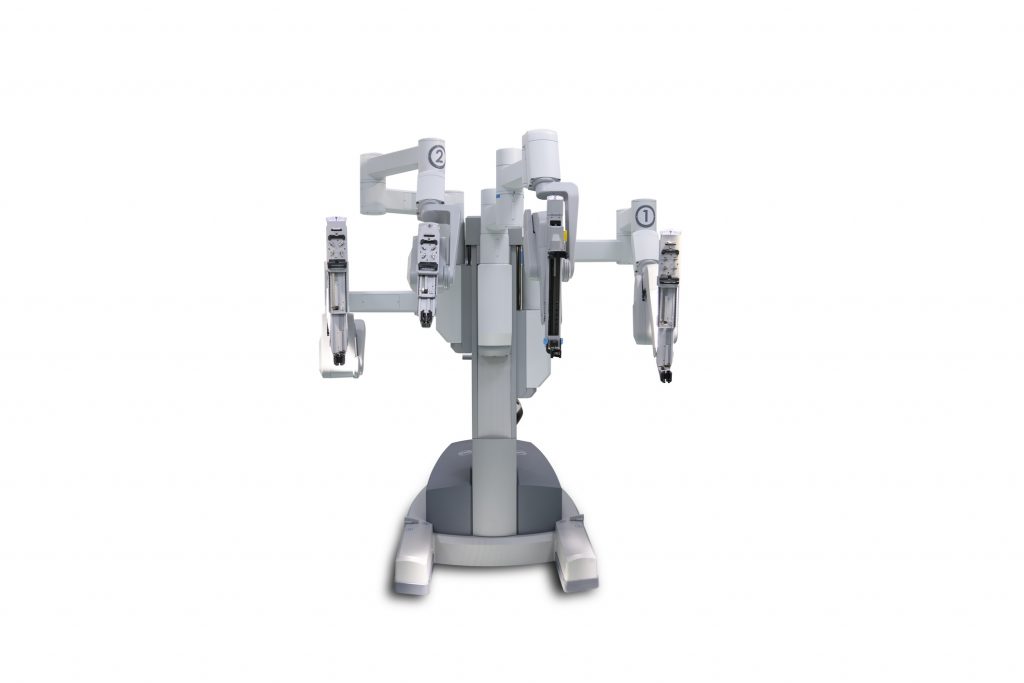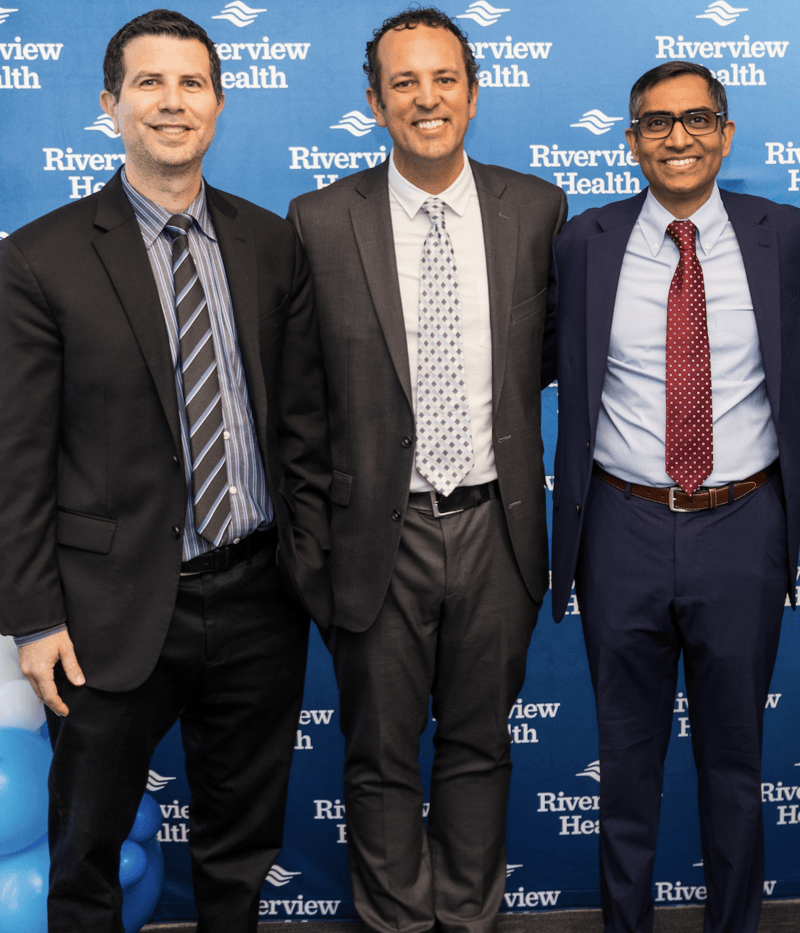Are you struggling with heartburn that won’t go away? Experiencing pain while swallowing? Losing weight without explanation? You may be dealing with a hernia. While symptoms can range from mild discomfort to more noticeable pain, it’s essential to understand the signs and get the proper treatment before your health takes a turn for the worse.
Navigating the complexities of digestive health can be one of the most challenging aspects of modern medicine. Issues often go undiagnosed for long periods, leaving patients frustrated and unsure where to turn. Fortunately, with emerging technologies like the da Vinci Surgical System, Riverview Health offers a comprehensive solution for hernia patients. Dr. John Martin and Dr. Thomas Shin, board-certified general surgeons at Riverview Health, offer insight as we discuss how these innovations revolutionize digestive care, providing quicker, more accurate diagnoses and more effective treatments.
Understanding Hiatal Hernias
A hiatal hernia, also known as a diaphragmatic or paraesophageal hernia, occurs when a portion of the stomach pushes up through the esophageal opening in the diaphragm into the chest. This condition can lead to symptoms such as difficulty swallowing, heartburn, weight loss, frequent vomiting and discomfort as food gets stuck in the esophagus.
“Hiatal hernias are surprisingly common, and many people may not even know they have one. However, when symptoms do occur, it becomes necessary to address the issue,” states Drs. Martin and Shin. “Left untreated, a hiatal hernia can cause significant long-term problems, including changes to the esophagus or stomach, and in rare cases, complications like stomach twisting or loss of blood supply.”
Traditionally, hiatal hernia surgery was invasive, with the introduction of laparoscopic techniques in the 1990s making the procedure less taxing. However, the advent of robotic-assisted surgery, such as the da Vinci, has completely transformed this process. The da Vinci Surgical System is a machine that uses four thin robotic arms, offering a wider range of motion than the human hand and delivering highly magnified views of the surgical area, making it possible for surgeons to operate minimally invasively.
“Historically, patients diagnosed with hiatal hernias would be referred to larger hospitals, but with the da Vinci, our team can now perform this surgery with enhanced precision and minimal invasion, allowing for minor disruption to surrounding tissues,” Drs. Martin and Shin note.
Recognizing the Symptoms: When to Seek Help
It’s essential to recognize the signs of a hiatal hernia so you can seek help from your primary care physician or GI doctor. Here are three common symptoms that may indicate the need for medical evaluation:
- Persistent heartburn, especially if it doesn’t improve with acid-suppressing medications.
- The sensation of food getting stuck or chest pain while swallowing, along with regurgitation.
- Unexplained weight loss, often accompanied by reduced appetite due to discomfort when eating.
- Unexplained shortness of breath.
For those experiencing symptoms, it is crucial to get a timely diagnosis and treatment.
Pre-Operative Testing and Evaluation
Before proceeding with surgery, a few diagnostic tests are essential to determine the severity of the condition and the best course of action:
- Endoscopy: A scope is used to examine the esophagus and stomach to assess any damage or abnormalities.
- Barium Swallow: This test involves drinking a contrast solution to assess the function of the esophagus and its ability to push food into the stomach.
- pH Testing: Some patients may require a test to measure acid reflux levels to determine the appropriate tightness of the surgical wrap.
Once these tests are completed, the surgical team can proceed with a customized treatment plan.
The Procedure: What to Expect
The surgical process to repair a hiatal hernia involves a few key steps:
- Repositioning the Stomach: The stomach is pulled from the chest into the abdomen into its correct native position.
- Closing the Hole: The opening in the diaphragm is then tightened to prevent the stomach from herniating back into the chest.
- Fundoplication: The top of the stomach is wrapped around the esophagus to recreate the function of the natural valve which prevents acid from flowing back into the esophagus, which is critical for patients with reflux symptoms.
For many patients, this is an outpatient procedure with an overnight stay for observation. After surgery, patients follow a strict diet to aid healing. This includes clear liquids for a few days, progressing to pureed foods for several weeks before returning to solid foods. The recovery process is generally smooth, but it’s essential to follow the dietary restrictions to ensure proper healing and avoid complications. Riverview Health’s nutrition and dietary experts are vital in guiding patients through this recovery phase.
A Collaborative Approach to Care
Riverview Health has successfully integrated its surgical capabilities with the expertise of its Gastroenterology (GI) specialists. With the addition of Dr. Matthew Bohm, Dr. Timothy Imler and Dr. Sashi Sagi, who are experienced in diagnosing and treating gastrointestinal conditions, Riverview Health offers a streamlined care experience.
(Pictured left to right: Dr. Matthew Bohm, Dr. Timothy Imler and Dr. Sashi Sagi)
“These specialists frequently identify hiatal hernias during endoscopic exams, and the surgical team is now able to step in and provide immediate next steps for treatment, thus eliminating the need for external referrals and ensuring patients receive seamless, continuous care,” Drs. Martin and Shin explained.
Looking Ahead: The Future of Hernia Repair at Riverview Health
By combining advanced technology, highly skilled professionals and a collaborative approach to patient care, Riverview Health is not just keeping up with the times—it’s setting a new standard for hernia repair surgery in our community.





